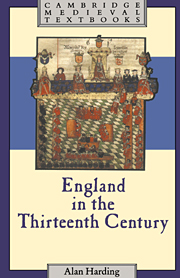Book contents
- Frontmatter
- Contents
- Preface and acknowledgements
- List of abbreviations
- Chronological table
- 1 Introduction: sources and interpretations
- 2 The peasants and the land
- 3 Traders and townsmen
- 4 Professional people
- 5 Knights
- 6 Magnates
- 7 Thirteenth-century politics
- Conclusion: the making of a state
- Guide to further reading
- Index
- Cambridge Medieval Textbooks
Preface and acknowledgements
Published online by Cambridge University Press: 05 June 2012
- Frontmatter
- Contents
- Preface and acknowledgements
- List of abbreviations
- Chronological table
- 1 Introduction: sources and interpretations
- 2 The peasants and the land
- 3 Traders and townsmen
- 4 Professional people
- 5 Knights
- 6 Magnates
- 7 Thirteenth-century politics
- Conclusion: the making of a state
- Guide to further reading
- Index
- Cambridge Medieval Textbooks
Summary
A century is an arbitrary stretch of time, which becomes history only as the processes taking place within it are understood. The most obvious processes are political, so that the first way chroniclers divided up the century was into the reigns of kings. For a long time history was about the way rulers exercised power in society, by open violence, but also by guile and the use of a growing apparatus of administration. As the records generated by administration were opened up, other types of interaction between the members of a community were discovered, such as the relations between lord and peasant in a manorial economy, and between employers and workers in the towns; or rather, it was gradually realized that these relationships could change over time, in patterns which might be fitted to the political themes. Social history reaches maturity when it can trace the growth of the framework of institutions, and of the culture which gives them significance. From at least the Tudor period the thirteenth century has been given crucial importance in English history as the period when Parliament and statute law emerged. At the same time it was perceived that the origins of Parliament needed to be traced to changing relationships within feudal society. On similar assumptions this book begins with an account of the uncovering of the sources for the history of England in the thirteenth century and the new interpretations that it provoked, and comes to the politics last, after tracing the social changes which lay behind them.
- Type
- Chapter
- Information
- England in the Thirteenth Century , pp. ixPublisher: Cambridge University PressPrint publication year: 1993



